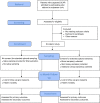Study protocol: Australasian Registry of Severe Cutaneous Adverse Reactions (AUS-SCAR)
- PMID: 35977774
- PMCID: PMC9389100
- DOI: 10.1136/bmjopen-2021-055906
Study protocol: Australasian Registry of Severe Cutaneous Adverse Reactions (AUS-SCAR)
Abstract
Introduction: Severe cutaneous adverse reactions (SCAR) are a group of T cell-mediated hypersensitivities associated with significant morbidity, mortality and hospital costs. Clinical phenotypes include Stevens-Johnson syndrome (SJS), toxic epidermal necrolysis (TEN), drug reaction with eosinophilia and systemic symptoms (DRESS) and acute generalised exanthematous pustulosis (AGEP). In this Australasian, multicentre, prospective registry, we plan to examine the clinical presentation, drug causality, genomic predictors, potential diagnostic approaches, treatments and long-term outcomes of SCAR in Australia and New Zealand.
Methods and analysis: Adult and adolescent patients with SCAR including SJS, TEN, DRESS, AGEP and another T cell-mediated hypersensitivity, generalised bullous fixed drug eruption, will be prospectively recruited. A waiver of consent has been granted for some sites to retrospectively include cases which result in early mortality. DNA will be collected for all prospective cases. Blood, blister fluid and skin biopsy sampling is optional and subject to patient consent and site capacity. To develop culprit drug identification and prevention, genomic testing will be performed to confirm human leukocyte antigen (HLA) type and ex vivo testing will be performed via interferon-γ release enzyme linked immunospot assay using collected peripheral blood mononuclear cells. The long-term outcomes of SCAR will be investigated with a 12-month quality of life survey and examination of prescribing and mortality data.
Ethics and dissemination: This study was reviewed and approved by the Austin Health Human Research Ethics Committee (HREC/50791/Austin-19). Results will be published in peer-reviewed journals and presented at relevant conferences.
Trial registration number: Australian New Zealand Clinical Trials Registry (ACTRN12619000241134).
Keywords: Adverse events; CLINICAL PHARMACOLOGY; Dermatological epidemiology; EPIDEMIOLOGY; IMMUNOLOGY; PREVENTIVE MEDICINE.
© Author(s) (or their employer(s)) 2022. Re-use permitted under CC BY-NC. No commercial re-use. See rights and permissions. Published by BMJ.
Conflict of interest statement
Competing interests: None declared.
Figures
References
Publication types
MeSH terms
Associated data
Grants and funding
LinkOut - more resources
Full Text Sources
Medical
Research Materials

